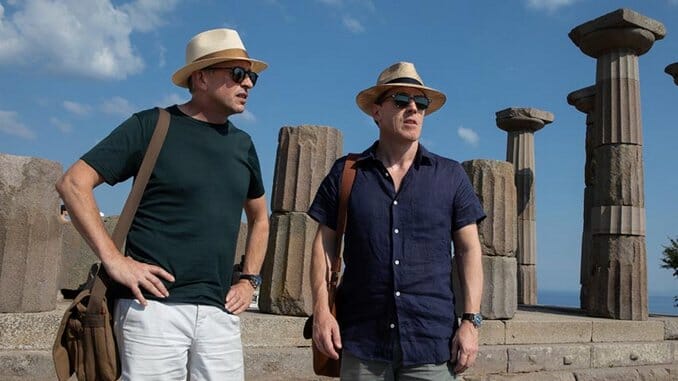The Trip to Greece Holds Steve Coogan Accountable Like No Other Trip Before
Images via IFC Films
Everyone relax: Steve Coogan survived his encounter with ISIS in North Africa at the end of 2017’s The Trip to Spain, and with minimal post-traumatic scarring to show for it. In fact, as he appears in The Trip to Greece, the fourth installment of Michael Winterbottom’s decade-running foodie travelogue series—whether in its original television format or its cut-for-American-cinemas film format—he remains the same self-aggrandizing blowhard he plays in most of his work. So, no harm done and no lessons learned, either, at least none he’s willing to explore with vulnerability and humility. That’s the Coogan people know and love.
The Trip to Greece opens in the middle of lunch with Coogan and Rob Brydon, his friend, confidant and conscience, both playing themselves, or versions of themselves. Ten years on, though, the lines between truth and fiction have blurred so much that these movies, or TV shows, give the pair space to act out their authentic personas (with some embellishment), functioning as retrospectives of their lives as well as their careers. Brydon and Coogan’s wry reflections are as much a product of their performances as their scripts. As with each preceding chapter in The Trip saga (franchise?), they co-write The Trip to Greece, though over the course of each foreign sojourn their chemistry has grown natural to the point where writing feels superfluous. By now, The Trip movies follow a strict formula, as if proving that formulas work, but its formula is part of the design: a continuation of the bickering and bantering Coogan and Brydon have engaged in since 2010.
-

-

-

-

-

-

-

-

-

-

-

-

-

-

-

-

-

-

-

-

-

-

-

-

-

-

-

-

-

-

-

-

-

-

-

-

-

-

-

-








































